

International Relations, National Security, and Global Competitiveness. Who Needs the Humanities at 'Start-Up U'? - November/December 2012. Stanford says everyone does, and wants to convince the world.
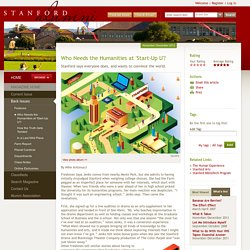
Freshman Saya Jenks comes from nearby Menlo Park, but she admits to having initially misjudged Stanford when weighing college choices. Humanities+ A Liberal Arts Education. Why Study the Liberal Arts?
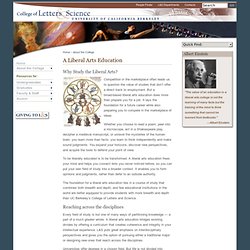
Competition in the marketplace often leads us to question the value of studies that don’t offer a direct track to employment. But a broad-based liberal arts education does more than prepare you for a job. Future of Liberal-Arts Colleges. Easton, Pa. —On Monday morning, a group of accepted applicants heard Daniel H. Weiss, president of Lafayette College, describe the virtues of residential liberal-arts institutions. Want Innovative Thinking? Hire from the Humanities.
Posted on Harvard Business Review: March 31, 2011 12:34 PM How many people in your organization are innovative thinkers who can help with your thorniest strategy problems?
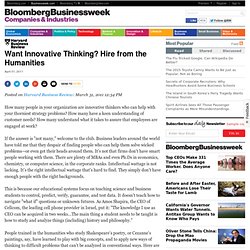
Debating the Value of College in America. My first job as a professor was at an Ivy League university.
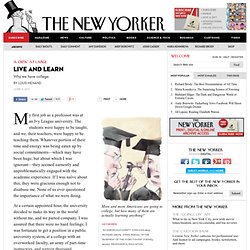
The students were happy to be taught, and we, their teachers, were happy to be teaching them. Whatever portion of their time and energy was being eaten up by social commitments—which may have been huge, but about which I was ignorant—they seemed earnestly and unproblematically engaged with the academic experience. If I was naïve about this, they were gracious enough not to disabuse me. Americans for the Arts. Research Studies - Special Topic Trends. Our funding trends reports provide the latest data available on every aspect of U.S. foundation philanthropy.
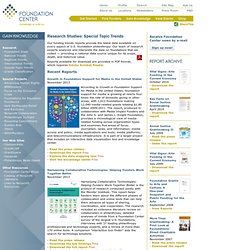
Our team of research experts analyzes and interprets the data on foundations that we collect — providing a national data source unique for its scope, depth, and historical value. Reports available for download are provided in PDF format, which requires Adobe Acrobat Reader. Growth in Foundation Support for Media in the United States November 2013 According to Growth in Foundation Support for Media in the United States, foundation support for media is growing at nearly four times the rate of domestic giving in other areas, with 1,012 foundations making 12,040 media-related grants totaling $1.86 billion 2009-2011. The Foundation Center: Higher and Graduate Educational Institutions. Maggie Morth Communications Manager The Foundation Center e-mail: Web: Foundation Giving for Higher, Graduate, and Professional Educational Institutions Totaled Nearly $7.3 Billion in 2002 —U.S. foundation support for colleges, community colleges, universities, professional schools, and graduate schools totaled an estimated $7.27 billion in 2002, up from $4.2 billion in 1997.
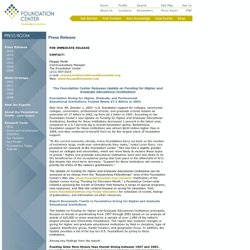
Report on Foundation Support Humanities. Humanities' Share of Foundation Giving Slips Over Past Decade —Giving by private foundations to the humanities more than doubled during the past decade, according to a new study conducted and published by the Foundation Center in collaboration with the American Academy of Arts & Sciences.
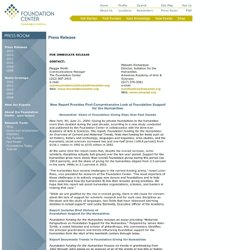
The report, finds that funding for fields such as art history, history and archeology, languages and linguistics, area studies, and the humanistic social sciences increased two and one-half times (149.8 percent) from $134.1 million in 1992 to $335 million in 2002. At the same time the report notes that, despite the overall increase, some scholarly disciplines actually lost ground over the ten year period. Survey on Higher Education. By Karin Fischer The American higher-education system has long been seen as a leader in the world, but confidence in its future and its enduring value may be beginning to crack along economic lines, according to two major surveys of the American public and college presidents conducted this spring.
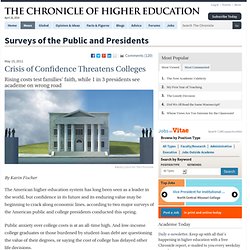
Graduates on the Value of HigherEd Degree. By Eric Hoover Scholastic skepticism is contagious.
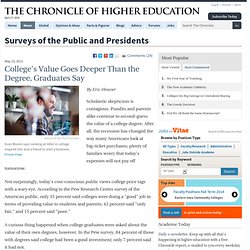
Pundits and parents alike continue to second-guess the value of a college degree. After all, the recession has changed the way many Americans look at big-ticket purchases; plenty of families worry that today's expenses will not pay off tomorrow. Not surprisingly, today's cost-conscious public views college price tags with a wary eye. According to the Pew Research Center survey of the American public, only 35 percent said colleges were doing a "good" job in terms of providing value to students and parents; 42 percent said "only fair," and 15 percent said "poor. " Most Presidents Favor No Tenure for Majority of Faculty - Surveys of the Public and Presidents. By Jack Stripling The deteriorating number of tenured positions in higher education is a common source of concern for faculty, but few college presidents seem perturbed by the trend.
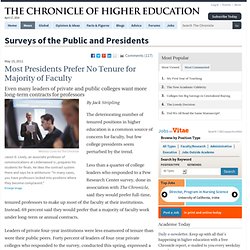
Less than a quarter of college leaders who responded to a Pew Research Center survey, done in association with The Chronicle, said they would prefer full-time, tenured professors to make up most of the faculty at their institutions. Instead, 69 percent said they would prefer that a majority of faculty work under long-term or annual contracts. Presidents on Signifiers of College Quality. By David Glenn In a year when public concern about the cost and purpose of college education is rising, a new survey has revealed an undercurrent of anxiety among college presidents about the quality of teaching and learning on their campuses.
More than a quarter of the presidents in the Pew Research Center survey, done in association with The Chronicle, said they worried that their faculty members were grading too leniently. More than half said students spent less time studying than they did a decade ago. Comment on the Future of College Eduation. By Daniel Yankelovich This issue of The Chronicle features two important surveys of higher education: one with college presidents and one with the public. These new data give us a chance to take a second look at some of the trends I discussed in an article for The Chronicle in November 2005. At that time, those trends appeared to be pushing higher education into a new era of turmoil, crisis, and challenge. Higher Education in 2011 - Surveys of the Public and Presidents. 2 Major Surveys of the American Public and College Presidents. Survey Public. Survey Presidents.
Humanities Resource Center Online. Web Caspar - Data Resource System. Table Builder: Create a data table This section contains a selection of WebCASPAR data sources. You can select one or more to use as the basis for your table. Click on the checkboxes next to the data sources (e.g., NSF Survey of Earned Doctorates/Doctorate Records File) to select the data sources of interest, then click on Select Data Source(s) to continue to the Modify Analysis Variables screen. Press Release on HRCO. The Humanities World Report Project.